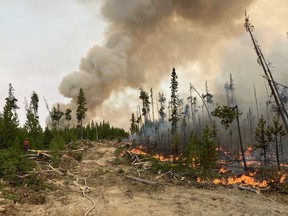Top Stories
B.C. Faces Economic Crisis Without Wildfire Risk Reduction

British Columbia’s economic future hangs in the balance, as a recent study warns that the province must significantly reduce wildfire risks. The paper, published in the journal Science, highlights the devastating impact of wildfires over the past decade, where more than 70,000 square kilometers have burned—an area equivalent to the size of the Republic of Ireland. The costs associated with fighting these fires have already reached $4.8 billion, with the provincial government setting aside $2.8 billion in its 2023-24 budget for wildfire contingencies.
The authors of the study, including wildfire ecologist Robert Gray and former University of Victoria law professor Calvin Sandborn, assert that the indirect costs—ranging from property loss to environmental damage—could inflate the total expenses by as much as 20 times. They urge immediate large-scale efforts to address these risks, or the province could face dire economic consequences.
Tribute to Jane Goodall
In related news, the conservation community mourns the loss of famed primatologist Jane Goodall, who passed away at the age of 91 due to natural causes. The Jane Goodall Institute announced her death while she was in California on a speaking tour. Goodall revolutionized the study of chimpanzees and became a prominent advocate for wildlife protection. Her activism gained momentum in the 1980s, leading to her tireless efforts to combat habitat destruction and promote animal welfare.
Goodall’s legacy as a champion for the environment continues to resonate. She once stated, “The time for words and false promises is past if we want to save the planet,” emphasizing the need for urgent action against climate change.
Legal Challenges Surround Natural Gas Pipeline
On the regulatory front, two legal challenges have emerged regarding the Prince Rupert Gas Transmission natural gas pipeline project. Petitioners argue that the project has not been “substantially started,” contradicting a decision made by the B.C. Environment Ministry in June. This decision allowed the pipeline to proceed without a new environmental assessment certificate, granted originally in 2014.
One of the petitions was filed by hereditary Chief Charles Wright of the Gitxsan Nation, who claims the project jeopardizes untouched territory and was approved without adequate consultation. The pipeline is planned to supply the Ksi Lisims liquefied natural gas facility off the B.C. coast, but the controversy surrounding its approval highlights the ongoing tensions between development and environmental stewardship.
Global Dietary Changes Could Save Millions
Meanwhile, a report from the EAT-Lancet Commission indicates that shifting to predominantly plant-based diets could prevent up to 15 million deaths annually and reduce agricultural emissions by 15 percent. The commission, which consists of scientists from around the world, asserts that significant changes in global food systems are crucial not only for human health but also for combating climate change and preserving biodiversity.
Study co-author Johan Rockström emphasizes that failure to transition away from unsustainable food practices will compromise efforts to tackle climate issues. The report advocates for a “planetary health diet” centered on grains, vegetables, fruits, nuts, and legumes, while suggesting that reducing red meat consumption is vital, particularly in developed countries.
As B.C. navigates these pressing challenges, the interplay between climate action and economic stability remains at the forefront of public discourse. The province’s response to the growing threats of wildfires, alongside the legacy of influential figures like Goodall and the implications of global dietary habits, will shape its environmental future.
-

 Education3 months ago
Education3 months agoBrandon University’s Failed $5 Million Project Sparks Oversight Review
-

 Science4 months ago
Science4 months agoMicrosoft Confirms U.S. Law Overrules Canadian Data Sovereignty
-

 Lifestyle3 months ago
Lifestyle3 months agoWinnipeg Celebrates Culinary Creativity During Le Burger Week 2025
-

 Health4 months ago
Health4 months agoMontreal’s Groupe Marcelle Leads Canadian Cosmetic Industry Growth
-

 Science4 months ago
Science4 months agoTech Innovator Amandipp Singh Transforms Hiring for Disabled
-

 Technology4 months ago
Technology4 months agoDragon Ball: Sparking! Zero Launching on Switch and Switch 2 This November
-

 Education4 months ago
Education4 months agoRed River College Launches New Programs to Address Industry Needs
-

 Business3 months ago
Business3 months agoRocket Lab Reports Strong Q2 2025 Revenue Growth and Future Plans
-

 Technology4 months ago
Technology4 months agoGoogle Pixel 10 Pro Fold Specs Unveiled Ahead of Launch
-

 Technology2 months ago
Technology2 months agoDiscord Faces Serious Security Breach Affecting Millions
-

 Education4 months ago
Education4 months agoAlberta Teachers’ Strike: Potential Impacts on Students and Families
-

 Education4 months ago
Education4 months agoNew SĆIȺNEW̱ SṮEȽIṮḴEȽ Elementary Opens in Langford for 2025/2026 Year
-

 Science4 months ago
Science4 months agoChina’s Wukong Spacesuit Sets New Standard for AI in Space
-

 Business4 months ago
Business4 months agoBNA Brewing to Open New Bowling Alley in Downtown Penticton
-

 Business4 months ago
Business4 months agoNew Estimates Reveal ChatGPT-5 Energy Use Could Soar
-

 Technology4 months ago
Technology4 months agoWorld of Warcraft Players Buzz Over 19-Quest Bee Challenge
-

 Business4 months ago
Business4 months agoDawson City Residents Rally Around Buy Canadian Movement
-

 Technology2 months ago
Technology2 months agoHuawei MatePad 12X Redefines Tablet Experience for Professionals
-

 Technology4 months ago
Technology4 months agoFuture Entertainment Launches DDoD with Gameplay Trailer Showcase
-

 Top Stories3 months ago
Top Stories3 months agoBlue Jays Shift José Berríos to Bullpen Ahead of Playoffs
-

 Technology4 months ago
Technology4 months agoGlobal Launch of Ragnarok M: Classic Set for September 3, 2025
-

 Technology4 months ago
Technology4 months agoInnovative 140W GaN Travel Adapter Combines Power and Convenience
-

 Science4 months ago
Science4 months agoXi Labs Innovates with New AI Operating System Set for 2025 Launch
-

 Technology4 months ago
Technology4 months agoNew IDR01 Smart Ring Offers Advanced Sports Tracking for $169










